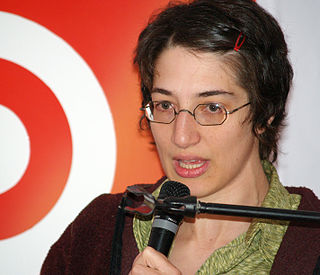A Quote by Steven Levenkron
Kessa began to cut her meat into tiny pieces. As a whole it was unmanageable, frightening; but divided and arranged, the meat could be controlled. She cut four pieces. She'd count to four between each bite.
Related Quotes
After coating pasta with tomato-rich meat sauce, my mom would drizzle the bottom of a nonstick pot with oil and put it all back in to form a dark crust of tangled noodles. Once she unmolded it at the table like a cake, my brothers and I would excitedly cut into it, verbally laying claim to our preferred pieces.
As Val jumped down onto the litter-strewn concrete after them, she thought how insane it was to follow two people she didn't know into the bowels of the subway, but instead of being afraid, she felt glad. She would make all her own decisions now, even if they were ruinous ones. It was the same pleasurable feeling as tearing a piece of paper into tiny, tiny pieces.
One thing I did have under my belt was, my mother lost her mother when she was 11. She mourned her mother her whole life and made my grandmother seem present even though I never met her. I couldn't imagine how my mom could go on but she did, she took care of us, she worked two jobs and had four children. She was such a good example of how to conduct oneself in a time of grief. When I lost my husband, I tried to model myself as much as I could on her.
No one writes a story like Lydia Davis. In the years since she began publishing her lyrical, extremely short fiction, she has quietly become one of the most impactful influences on American writers, even if they don't know it. That's largely because she makes economy seem so easy. You could read several of her stories into a friend's voicemail box before you were cut off (and you should). You could fit one of her stories in this column. Some you could write on your palm.
Was not Hypatia the greatest philosopher of Alexandria, and a true martyr to the old values of learning? She was torn to pieces by a mob of incensed Christians not because she was a woman, but because her learning was so profound, her skills at dialectic so extensive that she reduced all who queried her to embarrassed silence. They could not argue with her, so they murdered her.
I think Miss Moore was right to cut "The Steeple-Jack" - the poem seems plainer and clearer in its shortened state but she has cut too much... The reader may feel like saying, "Let her do as she pleases with the poem; it's hers, isn't it?" No; it's much too good a poem for that, it long ago became everybody's, and we can protest just as we could if Donatello cut off David's left leg.
I ordered a club sandwich, but I'm not even a member. "I like my sandwiches with three pieces of bread." "Well, so do I!" "Then let's form a club." "OK, but we need some more stipulations. Instead of cutting the sandwich once, let's cut it again. Yes, four triangles, arranged in a circle, and in the middle we will dump chips." "How do you feel about frilly toothpicks?" "I'm for 'em!" "Well, this club is formed."
I recall an 18-year-old girl named Rachel in Zambia who was given a grant to start a business of her choosing. She decided to breed goats so she could sell the meat and the milk, and donate the kids to orphan children. She herself was an orphan, stepping into young adulthood with no resources, and it was her first opportunity to earn her own money.
Here you go, dear."" The corners of Mrs. Colbert's mouth curled up. "You like meat, don't you?" Emily blinked. Was it her, or did that statement seem...loaded? She checked Issac for his reaction, but he was innocently selecting a roll from a wicker basket. "Uh, thanks." Emily said, pulling the platter toward her. She did like meat. The kind you, um, eat.



































